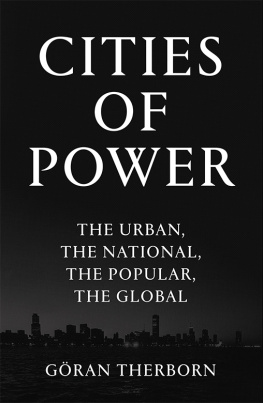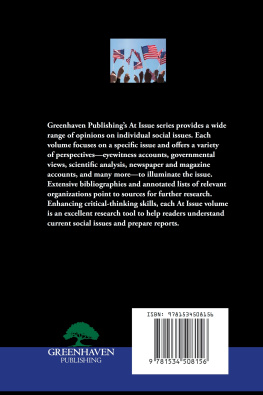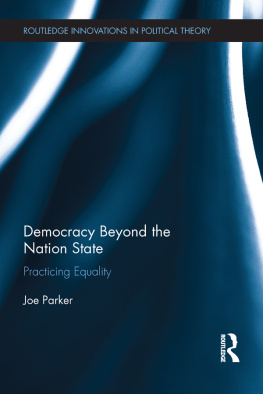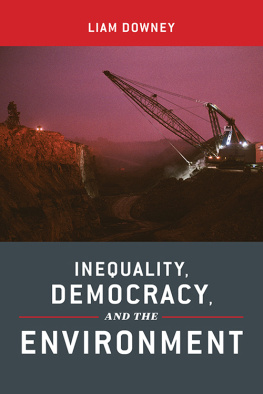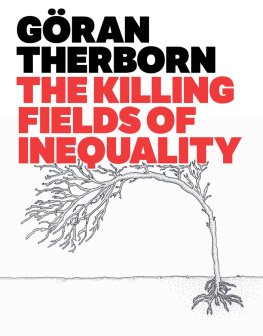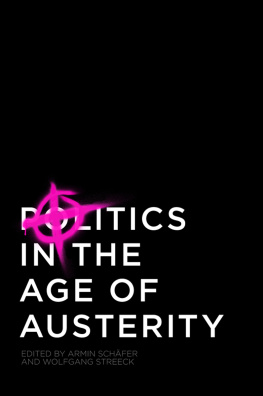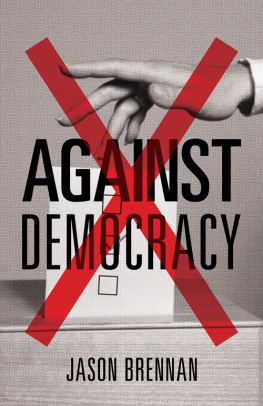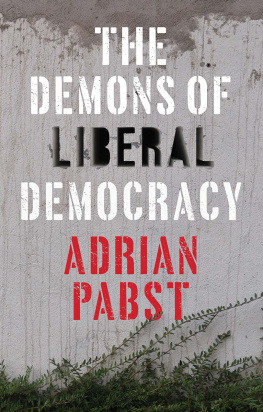Contents
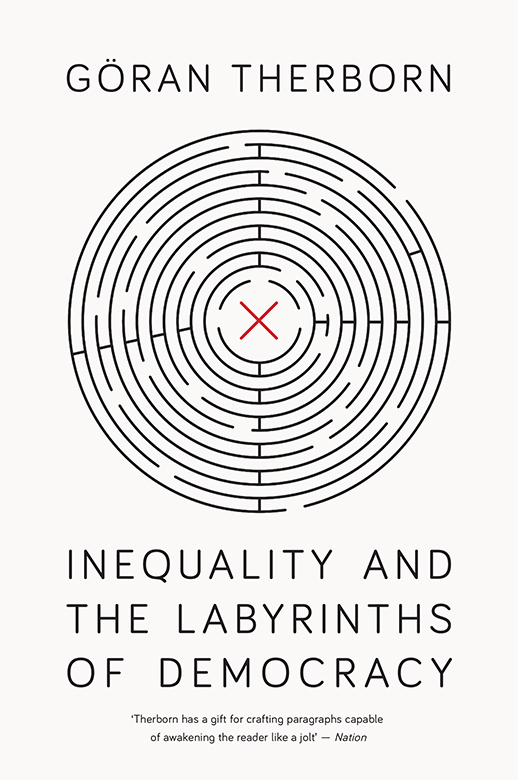
Inequality and the
Labyrinths of Democracy
Inequality and the
Labyrinths of Democracy
Gran Therborn

First published by Verso 2020
Gran Therborn 2020
An earlier version of Chapter 2 appeared in New Left Review I/103, MayJune 1977. An earlier version of Chapter 3 appeared in Rolf Torstendahl (ed.), State Theory and State History, London: Sage 1992.
All rights reserved
The moral rights of the author have been asserted
1 3 5 7 9 10 8 6 4 2
Verso
UK: 6 Meard Street, London W1F 0EG
US: 20 Jay Street, Suite 1010, Brooklyn, NY 11201
versobooks.com
Verso is the imprint of New Left Books
ISBN-13: 978-1-78873-899-6
ISBN-13: 978-1-78873-898-9 (HBK)
ISBN-13: 978-1-78873-900-9 (UK EBK)
ISBN-13: 978-1-78873-901-6 (US EBK)
British Library Cataloguing in Publication Data
A catalogue record for this book is available from the British Library
Library of Congress Cataloging-in-Publication Data
A catalog record for this book is available from the Library of Congress
Typeset in Sabon by MJ & N Gavan, Truro, Cornwall
Printed and bound by CPI Group (UK) Ltd, Croydon CR0 4YY
Typeset in Sabon by MJ & N Gavan, Truro, Cornwall
Printed in the US by Maple Press
Contents
Table 9. Percentage of Total Female Population Gainfully Employed c. 1930*
(Unpaid family workers excluded)
Two aims have directed this book, firstly to contribute to an understanding of capitalist democracy its rise and contemporary malfunctioning and secondly to contribute to the egalitarian Enlightenment, a multidisciplinary scholarly current spearheaded by Thomas Piketty and a phalanx of prominent economists, only now becoming fully visible as a major intellectual force.
Born and raised in a democratic country, and an anti-imperialist and anti-capitalist since my teens, I have always been intrigued by the workings of actually existing democracies, and how they have sponsored and often perpetrated discrimination, inequality, oppression, violence and injustice. These concerns have drawn me to scholarship historical and contemporary and to political demonstrations.
Today, problems of democracy and inequality have acquired a new urgency. Across Natoland and its environs, crisis is the defining feature of our politics, and inequality a central concern of academic economists as well as a public worry of the high bourgeoisie, from the Davos World Economic Forum to the Financial Times.
For egalitarian democrats these are difficult but also fascinating times, full of contradictory tendencies and urgent socio-ecological issues. We seem caught in a quagmire, with no obvious way out. The dilapidated and perverted democracy we have is unlikely to be completely obliterated. Although a turn to a popular social democracy is scarcely on the horizon, it is less improbable than a collapse into Fascism. An egalitarian world remains a long way off, but inequality between countries is falling slightly, and within a number of countries its growth has at least decelerated. Scenes of extreme poverty amidst plenty are less common than before. We are standing at the threshold of a new anti-egalitarian onslaught from automation and machine learning, but within the academy we are also witnessing a surge of radical intellectual activity. No occasion for despair or resignation, therefore, but rather for moral integrity and for sober long-term reflection, for remembering the history of democratic struggles, for reclaiming that popular legacy, and for looking into the future through the contradictions of the present.
This volume comprises three essays on the questions of democracy and inequality, from different periods. The earliest, The Rule of Capital and the Rise of Democracy, appeared in New Left Review in the summer of 1977, almost half a century ago, when the horizon looked red.
This collection therefore jumps ahead in time to The Right to Vote and the Four World Routes to/through Modernity, an essay dating from the doldrums of progressive politics in the early nineties. It was written for an international, interdisciplinary study, State Theory and State History (1992), edited by Rolf Torstendahl. It is a succinct global history of elective politics, conveying, I think, something of the joy of scholarly source-digging.
These two essays are reprinted here with only minor revisions. Among the omissions are short discussions of the research situation at the time, and no update in that respect has been added. While scholarship on democracy has certainly advanced and deepened since the seventies, I dont think it has falsified my two main theses.
Both essays claim historical discoveries. The first identified how liberal democracy arose from the contingent play of the contradictions of capitalism, and was sustained by the expansion and elasticity of the latter. Research for the second uncovered four major and enduring pathways to modernity and the nation-state, and thus to contemporary elective politics: an auto-centred but world-exploiting European pathway; the secession of the New World settler states; the emancipation of the Colonial Zone; and the exceptional survivors of European conquests, the countries of Reactive Modernization, led by Japan. This global matrix of modern social development I have expanded and deployed in several later works, above all in The World (2011) and Cities of Power (2017).
From my Latin American research, the main surprise was the discovery of the importance of a stable state order for democracy as well as for levels of inequality. The protracted (civil) wars of independence and national power in Hispanic America and in Haiti left a legacy not only of devastation, but also of militarized and deeply fractured societies and polities, inhibiting continuous political as well as social and economic development. Lack of a stable state order has weighed differently on Latin American countries, but its effects are still visible. Between 1950 and 1990, there were forty-four regime changes to and from democracy in Latin America, as compared to seventeen in Sub-Saharan Africa and eleven in Southeast Asia, and the reformist policies embarked upon in the first decade of this century have been abruptly and brutally discontinued in several countries.
The opening essay for this collection, Dysfunctional Democracies, was written specially for it, in the autumn and winter of 201920, in the context of the more critical political ambience of the post-2008 period. It looks back on the social forces fighting for democracy their demands, hopes and dreams presenting them as a legacy to be reclaimed by people today in their confrontations with the current political caste. The essay follows up the development over time of the relations between capital and democracy, and surveys the possibilities for future change which do exist, out of a tangle of contradictions, conflicts, and social and intellectual movements. However, social transformation will most likely require a disruptive democracy, of disruptive social movements, a process different from both the main twentieth-century paradigms of socio-political change: the gradual accumulation of organizational and electoral force, and violent revolution.
On the threshold of a new decade, there are two reasons for optimism. One is the new egalitarian Enlightenment in the social sciences, led by the Paris School of Economics. The political and economic consequences of the eighteenth-century Enlightenment were varied and convoluted. We should not expect many straightforward effects from that of our time. Nevertheless, the classical Enlightenment was culturally epochal and inspired revolutions in Europe and the Americas.


